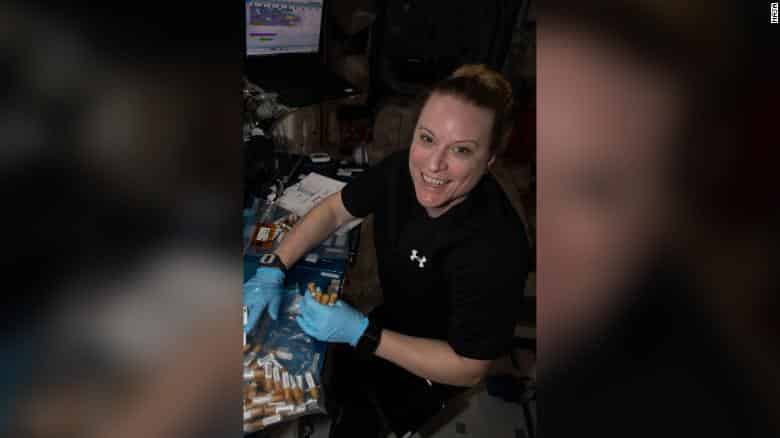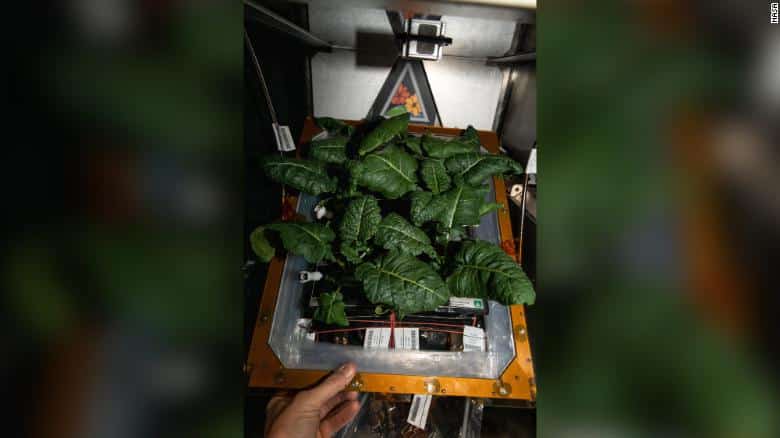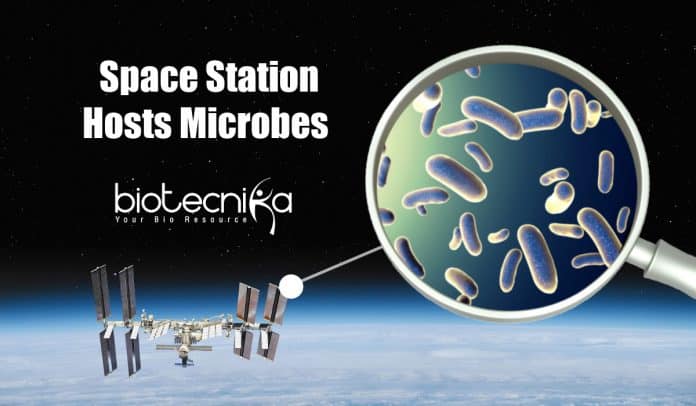Previously Unknown Space Microbe: Three Novel Bacteria Found On ISS (International Space Station)
Fungal and bacterial vivarium dwelling among us is perpetually increasing even in low-gravity conditions like the ISS (International Space Station).
After many years of service (around 20 years) to astronauts as a remote home, ISS has become the abode for unique bacteria. These microorganisms could prove beneficial.
Scientists from the USA and India working alongside NASA have currently uncovered four bacterial strains residing in various areas in the ISS- three of which were, so far, entirely unknown to
the scientific community. They could be utilized to enhance the growth of plants during extended spaceflight missions in the upcoming future.Three out of four bacterial strains were extracted in 2015 & 2016-one was discovered on an overhead board of the ISS research bases, the second was discovered inside the Cupola, the third was discovered on the dining table’s surface, and the fourth was discovered inside an old HEPA filter which returned back to Earth in 2011.
The four bacterial strains belonged to the soil & freshwater-dwelling bacterial family which are involved in plant growth, nitrogen fixation and can facilitate in stopping plant pathogens. Fundamentally, it is beneficial to have bacteria around if you are growing things.

You may be intrigued about the occurrence and functioning of such bacteria in spaces like on ISS, however, astronauts residing on space stations have been planting in small quantities for food for several years, therefore it is not unusual with the discovery of plant-related microorganisms aboard.
One of the bacterial strains discovered in the HEPA filter was characterized as a known species named Methylorubrum rhodesianum. The rest three were sequenced and identified that all belong to the same, but previously unknown species and the bacterial strains were named IIF4SW-B5, IIF1SW-B5, and IF7SW-B2T.
The group, led by Swati Bijlani, geneticist, University of Southern California, has proposed naming the newly discovered species as Methylobacterium ajmalii after the famous Indian biodiversity researcher, Muhammad Ajmal Khan, who passed away in 2019. This newly discovered species is closely associated with a known species, named M. indicum.
Kasthuri Venkateswaran, senior research scientist & Nitin Kumar Singh, planetary projection engineer worked together on this particular study to discern the potential uses of the bacteria at Jet Propulsion Laboratory (JPL), NASA, Pasadena, California.
Nitin Kumar Singh & Kasthuri Venkateswaran from the team at NASA’s JPL elucidated in a press report that in order to grow plants in extreme conditions with limited resources, extraction of novel microorganisms that facilitate enhanced plant growth in a stressful environment is critically essential.
Considering it is already known that these microorganisms can thrive in stressful environments of the ISS, the group placed the four bacterial strains through genetic analysis to find genes that could be beneficial for boosting plant growth.
The team mentioned in their study that the entire genome sequence assembly of the three ISS bacterial strains discussed here will allow the correlative genomic characterization of the strains with their counterparts in Earth for future studies.
This will additionally help in the detection of genetic determinants that may significantly be responsible for enhancing plant growth in microgravity environments and contribute to the advancement of self-reliant plant crops for prolonged space missions in the future.
Scientists detected that one of the ISS bacterial strains, which is IF7SW-B2T, has potential genes like the gene for an enzyme necessary for cytokinin, which enhances cell division in shoots and roots for plant growth.

The writers stated that as these three bacterial strains were derived at various times and from different sites, further study is needed about their ecological importance in closed environments and their persistence in the ISS surroundings.
There’s a lot more exploration required- the scientists admit that they have barely touched the surface of the microbiome on the space station. About 1,000 samples have been gathered on the ISS, however, are still waiting for the return to Earth.
Singh & Venkateswaran claimed that as their team has proficiency in culturing microbes from harsh habitats, they have been assigned to explore the ISS for the persistence and presence of the microbes by the NASA Space Biology Program.
The Methylobacterium discovered is not dangerous to the astronauts, either.
Obviously, the ISS is an aseptically maintained harsh environment. Team safety is the prime importance and therefore discerning plant/human pathogens is significant, however, useful microorganisms like this newly found Methylobacterium ajmalii are likewise needed.
Taking account of the bacterial quantity detected on space station still expecting analysis, and the potential for uncovering new bacterial strains, the scientists thought that molecular biology instruments could be devised to explore the bacteria as it is on the space station itself.
The researchers asserted that rather than returning the samples to Earth for studies, there is a requisite need for an integrated microbial monitoring unit that can retrieve, process, and examine samples in space employing molecular methodologies. These diminished “omics in space” technology, a biosensor development, will enable NASA and other space-exploring countries to attain sustainable and safe space traveling for extended periods of time.
Simply imagine the thrilling space-traveling microorganisms which are yet to be discovered.
The study has been published in the journal, Frontiers in Microbiology.
Unknown Space Microbes, Previously unknown microbe, Bacteria on ISS, Previously unknown microbe, Unknown Space Microbes
































